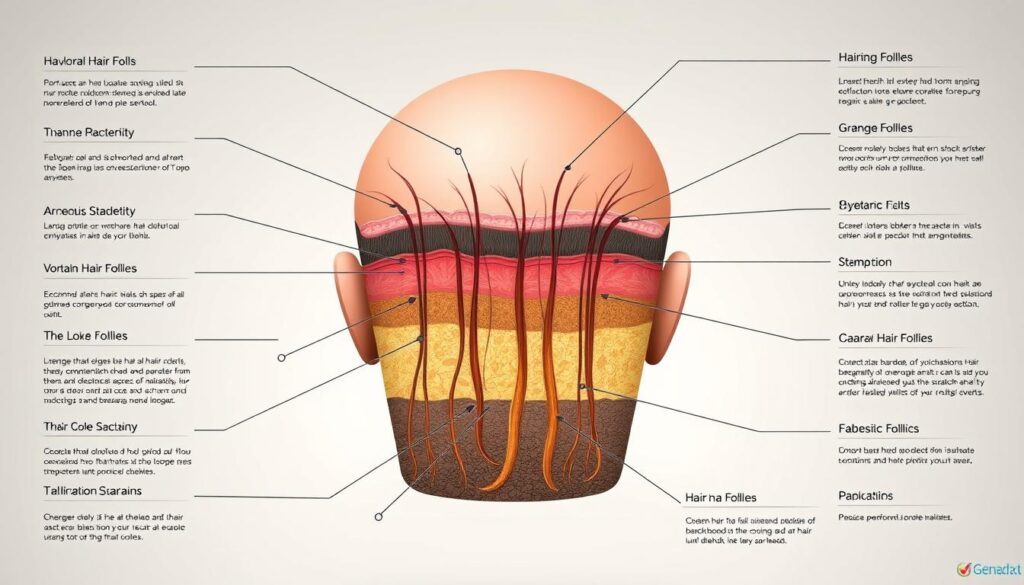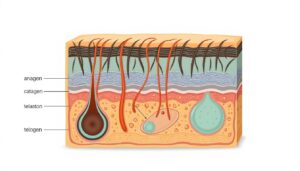Hair fall is a common issue affecting millions of people worldwide. Understanding the underlying reasons for hair loss is crucial to addressing the problem effectively. Mister Hair offers a comprehensive approach to identifying the root causes of hair fall.
With Mister Hair, individuals can gain insights into the factors contributing to their hair loss. By analyzing the causes, Mister Hair provides a personalized understanding of hair fall, enabling individuals to take targeted actions.
Key Takeaways
- Understanding the root causes of hair fall is essential for effective treatment.
- Mister Hair offers a comprehensive analysis of hair loss causes.
- Personalized insights enable targeted actions against hair fall.
- Mister Hair benefits individuals by providing a clear understanding of their hair loss.
- Effective hair fall treatment starts with identifying the underlying causes.
Understanding Hair Fall: More Than Just Shedding
While shedding a few strands daily is normal, excessive hair fall can be a sign of an underlying issue. It’s essential to understand that hair loss is a complex process influenced by various factors, including genetics, health conditions, and lifestyle choices.
Normal Hair Loss vs. Problematic Hair Fall
Normal hair loss is a part of the hair growth cycle, where losing up to 100 strands per day is considered average. However, when this number exceeds the normal range, it may indicate a problem. Problematic hair fall can be due to various reasons, including medical conditions, nutritional deficiencies, or excessive stress.
The Hair Growth Cycle Explained
The hair growth cycle consists of three phases: anagen (growth), catagen (transitional), and telogen (resting). Understanding these phases is crucial for identifying when hair loss becomes problematic.
| Phase | Duration | Description |
|---|---|---|
| Anagen | 2-6 years | Active growth phase |
| Catagen | 2-3 weeks | Transitional phase |
| Telogen | 3-4 months | Resting phase |
Signs Your Hair Loss Needs Attention
If you’re noticing excessive shedding, thinning, or bald patches, it’s time to investigate the cause. Other signs include a receding hairline or sudden hair loss.
Understanding the root cause of your hair fall is the first step towards addressing it effectively. By recognizing the signs and understanding the hair growth cycle, you can take proactive steps towards maintaining scalp health and reducing hair loss.
Why Identifying the Root Cause of Hair Fall Matters
Identifying the root cause of hair loss is more than just a diagnostic step; it’s the foundation for a successful hair fall treatment plan. Rather than just treating the symptoms, understanding the underlying reasons for hair fall can lead to more effective and lasting solutions.
Beyond Symptom Treatment
Treating hair loss symptoms without addressing the underlying cause can lead to temporary solutions at best. For instance, using topical treatments might slow down hair loss, but if the root cause is a nutritional deficiency or hormonal imbalance, the treatment might not be fully effective. Mister Hair emphasizes the importance of diagnosing the underlying cause to provide a comprehensive treatment plan.
Long-term Benefits of Addressing Underlying Causes
Addressing the root cause of hair fall can have several long-term hair health benefits. These include:
- More effective treatment outcomes
- Prevention of further hair loss
- Potential for hair regrowth
- Improved overall scalp health
| Benefits | Description |
|---|---|
| Effective Treatment | Targeted treatment based on the root cause |
| Hair Regrowth | Potential for regrowing lost hair |
| Scalp Health | Improved health of the scalp |
The Cost of Ignoring Hair Loss Problems
Ignoring hair loss or only treating the symptoms can have long-term costs, both financially and in terms of personal well-being. The cost of continuous, ineffective treatments can add up, and the emotional toll of ongoing hair loss should not be underestimated. By addressing the root cause, individuals can avoid these unnecessary costs and achieve better outcomes with Mister Hair benefits, including personalized care and effective treatment plans.
By understanding the importance of identifying the root cause of hair fall, individuals can take the first step towards a more effective and lasting solution. This approach not only improves hair health but also enhances overall well-being.
Root Cause Analysis for Hair Fall: The Mister Hair Approach
At Mister Hair, we employ a scientific methodology to determine the underlying reasons for hair loss. Our approach is designed to provide a comprehensive understanding of the factors contributing to hair fall, enabling us to develop effective treatment plans.
Scientific Methodology
Our scientific methodology involves a thorough examination of the scalp and hair follicles. This includes advanced techniques such as digital scalp analysis and hair follicle examination, which help us identify the root cause of hair loss.
Comprehensive Assessment Framework
The comprehensive assessment framework used by Mister Hair includes a detailed evaluation of various factors that could be contributing to hair fall. This framework ensures that no potential cause is overlooked, allowing for a thorough understanding of the issue.
Personalized Analysis Process
Our personalized analysis process involves a close examination of each individual’s scalp and hair health. This includes:
- Digital Scalp Analysis: A detailed digital examination of the scalp to identify any abnormalities or conditions that may be contributing to hair loss.
- Hair Follicle Examination: A thorough examination of the hair follicles to assess their health and identify any potential issues.
By combining these techniques, we can gain a comprehensive understanding of the factors contributing to hair fall and develop a personalized treatment plan to address the root cause.
Common Causes of Hair Fall in Americans
Americans are increasingly seeking answers to hair fall, driven by a mix of genetic, medical, and lifestyle factors. Hair loss is a complex issue, and understanding its causes is the first step towards addressing it.
Genetic Factors: Understanding Hereditary Hair Loss
Genetic factors play a significant role in hair loss, particularly in conditions like androgenetic alopecia, also known as male or female pattern baldness. This hereditary condition is characterized by a receding hairline and thinning on the crown of the head in men, and thinning hair on the top of the scalp in women.
Medical Conditions That Trigger Hair Shedding
Various medical conditions can lead to hair loss, including thyroid disorders, autoimmune diseases like alopecia areata, and skin conditions such as psoriasis and eczema. These conditions disrupt the normal hair growth cycle, leading to excessive shedding.

Nutritional Deficiencies and Their Impact
Nutritional deficiencies, particularly in iron, zinc, and biotin, can significantly impact hair health, leading to hair loss. A diet lacking essential nutrients can weaken hair follicles, causing them to fall out.
Stress and Lifestyle Influences
Stress and lifestyle factors, including excessive styling, harsh chemical treatments, and poor diet, can contribute to hair loss. Chronic stress can disrupt the hair growth cycle, leading to conditions like telogen effluvium, where more hairs than usual enter the shedding phase.
| Cause | Description | Impact on Hair |
|---|---|---|
| Genetic Factors | Hereditary conditions like androgenetic alopecia | Pattern baldness, thinning hair |
| Medical Conditions | Thyroid disorders, autoimmune diseases | Disrupts hair growth cycle, excessive shedding |
| Nutritional Deficiencies | Lack of iron, zinc, biotin | Weakens hair follicles, hair loss |
| Stress and Lifestyle | Chronic stress, excessive styling, poor diet | Disrupts hair growth, leads to shedding |
Understanding these common causes of hair fall is crucial for developing effective treatment plans. By addressing the underlying factors, individuals can take the first step towards restoring their hair health.
The Mister Hair Diagnostic Process
At Mister Hair, we believe that an accurate diagnosis is the foundation of effective hair loss treatment, which is why our diagnostic process is so thorough.
Initial Consultation and Assessment
The first step in our diagnostic process is an initial consultation where our experts engage with you to understand your hair loss concerns. This involves a detailed discussion about your hair fall experiences, medical history, and lifestyle factors.
Advanced Scalp and Hair Analysis
Our clinics are equipped with advanced technology to perform a thorough scalp and hair analysis. This includes examining the scalp condition, hair density, and the overall health of your hair follicles.
Medical History Evaluation
Understanding your medical history is crucial in identifying potential causes of hair loss. Our experts will evaluate any past or present medical conditions that could be contributing to your hair fall.
Lifestyle and Nutritional Assessment
Lifestyle and nutritional factors play a significant role in hair health. Our assessment includes evaluating your diet, stress levels, and other lifestyle factors that could be impacting your hair.
By combining these elements, we can provide a comprehensive understanding of your hair loss and develop a personalized plan to address it.
Hormonal Imbalances and Hair Loss
Understanding the link between hormonal fluctuations and hair loss is crucial for effective treatment. Hormonal imbalances can significantly affect hair health, leading to excessive shedding or thinning.
Thyroid Disorders and Hair Health
Thyroid disorders, including hypothyroidism and hyperthyroidism, can cause hair loss due to the thyroid gland’s role in regulating metabolism and hair growth cycles. When thyroid hormone levels are imbalanced, it can lead to changes in hair texture and increased shedding.
Androgen-Related Hair Loss Patterns
Androgens, such as dihydrotestosterone (DHT), play a significant role in hair loss, particularly in conditions like androgenetic alopecia. High levels of DHT can lead to hair follicle shrinkage, resulting in thinner, shorter hairs.
Hormonal Changes During Life Stages
Hormonal fluctuations during different life stages can also impact hair health. Pregnancy and postpartum hair loss are common due to changes in estrogen levels. Similarly, menopause brings significant hormonal shifts that can affect hair.
Pregnancy and Postpartum Hair Loss
During pregnancy, increased estrogen levels can lead to thicker, healthier-looking hair. However, after childbirth, the drop in estrogen can cause a significant increase in hair shedding.
Menopause and Hormonal Shifts
Menopause is associated with a decline in estrogen levels, which can lead to hair thinning and loss. Managing these hormonal changes is key to mitigating their impact on hair health.

Nutritional Factors Affecting Hair Health
The food we eat plays a vital role in determining the health and strength of our hair. A diet lacking essential nutrients can lead to hair fall and slow down hair growth. Understanding the nutritional factors that affect hair health is crucial for promoting healthy hair and preventing excessive hair loss.
Essential Vitamins and Minerals for Hair Growth
Vitamins and minerals are vital for hair growth. Vitamin C helps in the production of collagen, which gives structure to hair. Biotin and Vitamin B are known to enhance hair growth by improving the infrastructure of hair follicles. Iron and Zinc play significant roles in maintaining healthy hair by supporting the hair growth cycle and keeping the scalp healthy.
Protein Deficiency and Hair Structure
Hair is primarily made of protein, known as keratin. A deficiency in protein can lead to hair loss and weaken the hair structure. Consuming adequate amounts of protein-rich foods like lean meats, fish, eggs, and legumes is essential for maintaining healthy hair.
Diet Modifications for Healthier Hair
Making dietary changes can significantly impact hair health. Increasing the intake of fruits, vegetables, whole grains, and lean proteins can provide the necessary nutrients for hair growth. It’s also important to stay hydrated by drinking plenty of water.
Supplements That Support Hair Recovery
In addition to a balanced diet, certain supplements can support hair health. Biotin supplements are popular for promoting hair growth. Vitamin D and Omega-3 fatty acids also contribute to healthier hair. However, it’s essential to consult with a healthcare professional before starting any supplement regimen.
Stress, Lifestyle, and Environmental Impact on Hair
The relationship between stress, lifestyle, and hair health is complex and multifaceted. As we’ve explored in previous sections, hair loss can be triggered by a variety of factors, including genetics, medical conditions, and nutritional deficiencies. However, stress, lifestyle choices, and environmental exposures also play a significant role in hair health.
How Chronic Stress Affects Hair Follicles
Chronic stress can lead to hair loss by disrupting the normal hair growth cycle. When the body is under stress, it produces more cortisol, a hormone that can contribute to hair shedding. Prolonged exposure to cortisol can lead to hair follicles entering the resting phase prematurely, resulting in excessive hair loss.
Sleep Quality and Hair Regeneration
Sleep quality is crucial for overall health, including hair regeneration. During sleep, the body repairs and regenerates tissues, including hair follicles. Poor sleep quality can disrupt this process, potentially leading to hair loss. Ensuring adequate sleep is essential for maintaining healthy hair.
Environmental Factors and Protection
Environmental factors such as pollution, UV radiation, and hard water can damage hair and scalp, contributing to hair loss. Using protective measures like hats, hair serums with antioxidants, and water filters can help mitigate these effects.
Stress Management Techniques for Hair Health
Managing stress is crucial for maintaining healthy hair. Techniques such as meditation, yoga, and regular exercise can help reduce stress levels. Additionally, a balanced diet rich in vitamins and minerals supports hair health.
By understanding the impact of stress, lifestyle, and environmental factors on hair, individuals can take proactive steps to protect their hair health. This holistic approach, combined with proper hair care and medical interventions when necessary, can help mitigate hair loss and promote healthy hair growth.
Customized Treatment Plans Based on Root Causes
Every individual’s hair loss journey is unique, and so should be their treatment plan. At Mister Hair, we believe in addressing the root cause of hair fall rather than just its symptoms. This approach ensures that our clients receive the most effective treatment tailored to their specific needs.
Medical Interventions for Different Conditions
Depending on the underlying cause of hair loss, medical interventions can range from medications that stimulate hair growth to treatments that address underlying health issues. For instance, minoxidil and finasteride are commonly prescribed for androgenetic alopecia.
For conditions like alopecia areata, treatments may include corticosteroids or immunotherapy. Our experts work closely with clients to determine the most suitable medical intervention.
Topical Treatments and Their Effectiveness
Topical treatments are often the first line of defense against hair loss. These can include low-level laser therapy (LLLT) devices, which stimulate hair growth by increasing blood flow to the scalp.
Topical applications like minoxidil can also be effective in slowing down hair loss and promoting regrowth. The effectiveness of these treatments varies from person to person, depending on the cause and extent of their hair loss.
Lifestyle Modifications for Long-term Results
Lifestyle changes play a crucial role in maintaining healthy hair and preventing further loss. This includes dietary adjustments, stress management, and avoiding harsh hair care practices.
- Eating a balanced diet rich in vitamins and minerals
- Reducing stress through meditation or yoga
- Avoiding excessive heat styling or chemical treatments
Nutritional Protocols for Hair Restoration
Nutrition is fundamental to hair health. Certain nutrients are particularly beneficial for hair growth, including biotin, vitamin D, and iron.
Targeted Supplementation
Supplements can help fill nutritional gaps that may be contributing to hair loss. For example, biotin supplements can strengthen hair follicles and promote growth.
Anti-inflammatory Diet Approaches
An anti-inflammatory diet can help reduce inflammation that may be associated with hair loss. This includes consuming foods rich in omega-3 fatty acids, antioxidants, and fiber.
| Nutritional Element | Benefit for Hair Health | Food Sources |
|---|---|---|
| Biotin | Strengthens hair follicles | Eggs, nuts, whole grains |
| Vitamin D | Promotes hair growth | Fatty fish, fortified dairy products |
| Iron | Essential for hair growth | Red meat, spinach, fortified cereals |
Success Stories: Real Results from Mister Hair’s Analysis
Discover how Mister Hair’s expert analysis has led to remarkable hair recovery success stories. Our comprehensive approach to understanding hair loss has enabled us to help numerous individuals regain their hair health.
Reversing Stress-Induced Hair Loss
One of our clients, a 35-year-old marketing executive, experienced significant hair loss due to chronic stress. After undergoing Mister Hair’s analysis, it was determined that stress management and specific nutritional supplements were key to his recovery. Within six months, he noticed a significant reduction in hair loss and an improvement in hair density.
Addressing Nutritional Deficiencies
A 28-year-old woman struggled with hair loss due to nutritional deficiencies, particularly iron and vitamin D. Mister Hair’s analysis led to a personalized dietary plan and supplementation. She reported a noticeable improvement in hair growth and strength within a few months.
Managing Hormonal Hair Loss
A 42-year-old man experienced hair thinning due to hormonal imbalances. Through Mister Hair’s analysis, a treatment plan was developed that included medical interventions and lifestyle changes. He achieved a significant stabilization of hair loss and some regrowth.
The Journey to Hair Recovery
These success stories highlight the effectiveness of Mister Hair’s comprehensive analysis in addressing various causes of hair loss. By understanding the root cause, our clients are empowered to take control of their hair health, leading to successful outcomes.
Conclusion: Taking Control of Your Hair Health Journey
Understanding the root cause of hair fall is crucial to regaining a healthy and full head of hair. Mister Hair’s comprehensive analysis and personalized approach empower individuals to take control of their hair health journey. By identifying the underlying causes of hair loss, Mister Hair’s experts can develop effective treatment plans that address specific needs.
The benefits of Mister Hair’s services extend beyond just treating hair loss; they promote overall hair health and well-being. By incorporating simple hair care tips into daily routines, individuals can maintain healthy hair and prevent future problems. Mister Hair’s holistic approach to hair care encourages a long-term perspective, focusing on sustainable hair health solutions.
Embarking on a hair health journey requires patience, dedication, and the right guidance. With Mister Hair’s expertise and support, individuals can achieve their hair goals and enjoy a fuller, healthier head of hair. Start your journey today and discover the Mister Hair benefits that can transform your hair care experience.





